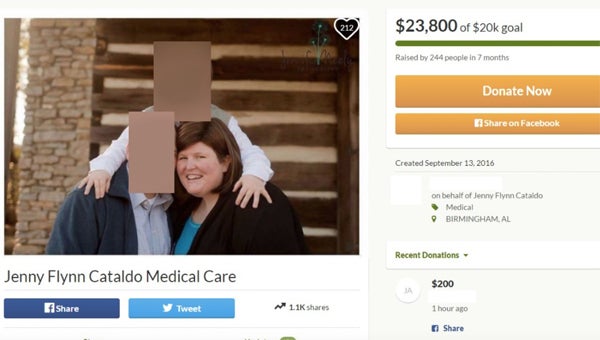Woman gets two years, must pay restitution for false cancer fundraising
Published 4:25 pm Thursday, November 9, 2017

- Jennifer Flynn Cataldo used two online fundraising campaigns to solicit money from donors wishing to assist her with medical bills and a family vacation. (CONTRIBUTED)
FROM STAFF REPORTS
BIRMINGHAM – A federal judge on Wednesday, Nov. 8, sentenced a Shelby County woman to more than 25 months in prison for fraudulently soliciting more than $260,000 by falsely claiming she had terminal cancer.
Jennifer Flynn Cataldo, 37, of Sterrett, pleaded guilty in August to one count of wire fraud and one count of bank fraud for using her claim of terminal cancer to get money from family and friends and to solicit donations through the online fund-raising site, GoFundMe.
U.S. District Court Judge Virginia Emerson Hopkins sentenced Cataldo to 25 months and 20 days in prison and ordered her to pay $79,629 in restitution to the victims of her fraud, and to forfeit that amount to the government as proceeds of illegal activity, announced U.S. Attorney Jay E. Town, FBI Special Agent in Charge Johnnie Sharp Jr. and Alabama Attorney General Steve Marshall.
“This defendant’s conduct was reprehensible,” Town said. “For more than two years she engaged in an elaborate scheme that preyed upon the sympathy and generosity of her friends and family. Not only did she fake cancer to take their money, she used her minor child as part of her ruse and allowed the child to believe his mother was dying. She has earned every nickel of her punishment.”
“Crimes like this make good people think twice before they are willing to be charitable, and Cataldo’s conduct could have a chilling effect on donations to legitimate accounts set up for people who are truly in need,” Sharp said. “It is hard to understand how anyone could ignore the anguish that their greed- or drug-fueled lie brought to their loved ones every single day.”
“This crime involved an act of calculated cruelty carried out over a prolonged time, causing terrible anguish and grief to the defendant’s family and friends, as well as her own young child, who were led to believe she was dying. She took heartless advantage of their love as well as the compassion of strangers who gave generously to meet what they believed was a desperate need,” Marshall said. “The fact that we now know that part of the money was going to fund illegal opioids is yet more evidence of how destructive these drugs can be. It is imperative that we confront such criminal activities and that the offenders are stopped and punished.”
Cataldo fraudulently collected a total of $264,163 in checks and cash deposited into her personal checking account, according her guilty plea. A government sentencing document states that throughout Cataldo’s scheme, she was spending part of the money she obtained fraudulently to pay for 30 to 40 non-prescribed Percocet, an opioid containing painkiller, per day.
Court documents, including Cataldo’s plea agreement, describe her fraudulent scheme as follows:
From 2014 to about May 2017, Cataldo misrepresented to friends and family that she had been diagnosed with terminal cancer. In person, online and via text messages, she solicited contributions from friends, family and others and received the more than $200,000 in donations for expenses including utilities and living, medical, insurance and funeral costs. In January 2016, Cataldo also created an account on the GoFundMe website titled, “Mom has Terminal Cancer Disney Trip,” with the stated goal of raising $4,000 to take her young child to visit Disney before she died. The account featured a photo of the child on the cover and a statement from Cataldo that she had “had cancer for two years and was just told it was inoperable! I would like to experience this with my [minor child] before I die within the year.” That account raised more than $10,000.
In September 2016, a friend who believed Cataldo was suffering from terminal cancer created a second GoFundMe account titled, “Jenny Flynn Cataldo Medical Care,” with a $20,000 fund-raising goal. The medical GoFundMe account featured a photo of Cataldo, her husband and their child. The accompanying story related that Cataldo had been battling cancer for three years, that it was no longer treatable and “the primary goal of medical care at this point is to give Jenny as much time as possible” with her husband and child.
Between September 2016 and May 2017, Cataldo repeatedly re-posted the medical GoFundMe account link to her Facebook page with messages thanking people for their contributions, giving false updates on her condition, and requesting more donations. The medical account raised more than $25,000. Cataldo withdrew $27,755 and deposited it into her personal banking account.
In addition to the two GoFundMe accounts, Cataldo solicited funds on Facebook, in person, and by phone, e-mail and text message to friends, family and organizations, including churches. Some of those individuals paid third-party vendors on Cataldo’s behalf.
The FBI and the Alabama Attorney General’s Office investigated the case, which Assistant U.S. Attorney Robin Beardsley Mark is prosecuting.










